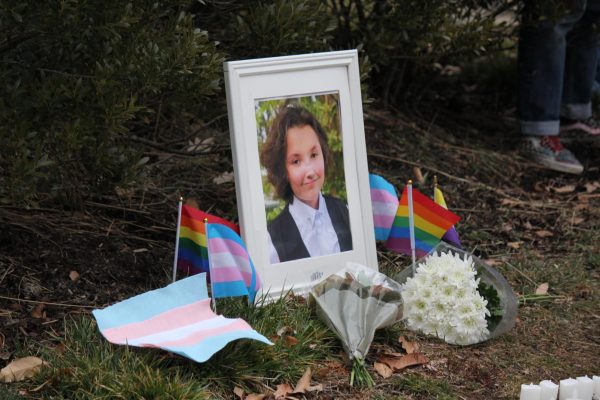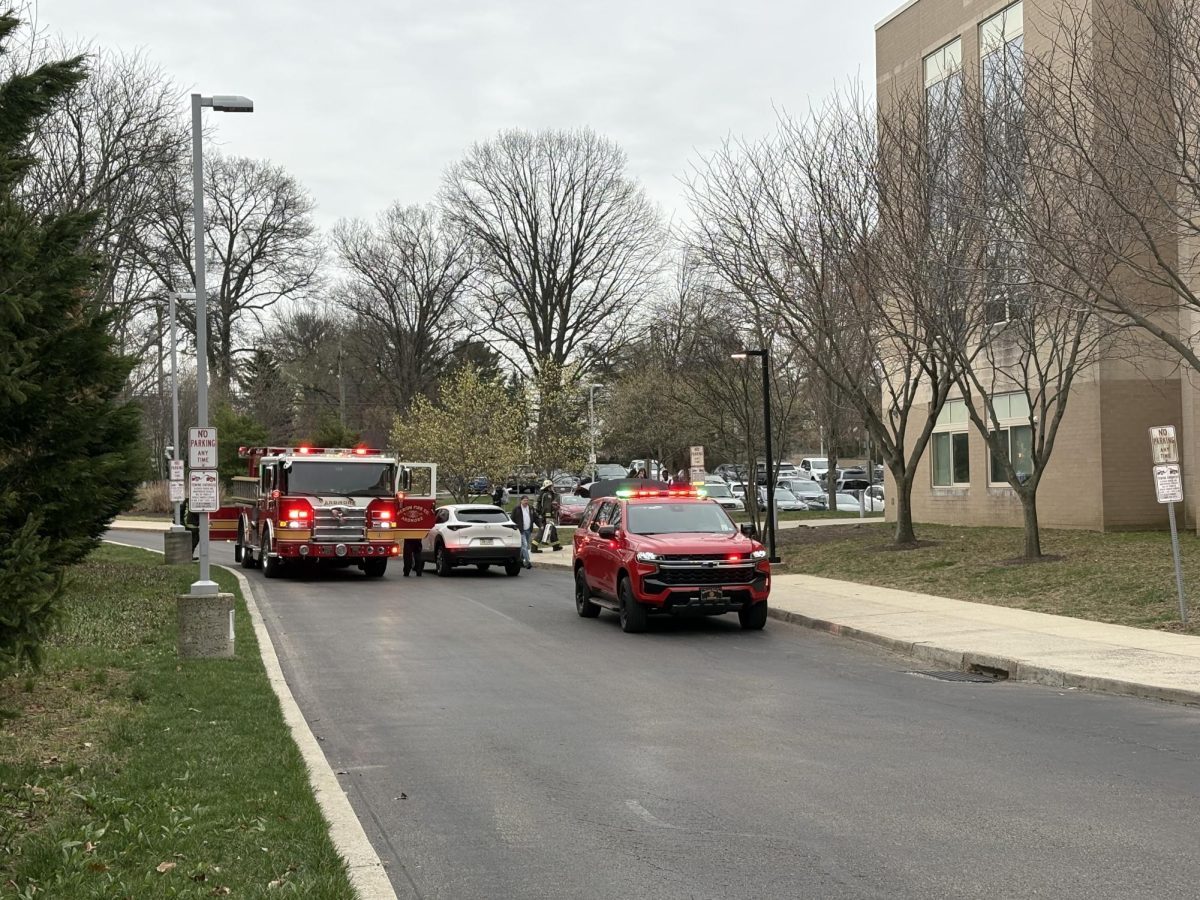
On Friday, February 23, under striking blue and pink streaks of sunset, a mass of fifty to sixty students, parents, and community members clustered around 56 orange candles. In the chilly wind, many students wrapped themselves in coats and pride flags to mourn the loss of Nex Benedict, a 16-year-old who was brutally beaten and later died in Oklahoma. Benedict faced an altercation with a group of peers in one of Owasso High School’s girls’ bathrooms on February 7. Although many details about Benedict’s death aren’t yet released publicly, camera footage from an interview between police and Benedict only hours after the event reveals some insight into what happened. Benedict explains that they and a friend were being “laughed at” by a group of peers. When Benedict tried to pour water on them, the group of students began to beat them until Benedict hit their head on the hard floor and ultimately blacked out. The entire altercation lasted around two minutes. Benedict was later discharged from the hospital and the next day collapsed at home and was declared dead. Many of Oklahoma’s long-standing anti-transgender pieces of legislation have come under attack in the weeks following Benedict’s death, including a prohibition on gender-neutral status on birth certificates and bans on gender-transition care for minors. One of these such policies is a law forcing students to use bathrooms of their sex assigned at birth and has been criticized for its implications on Benedict’s attack. Benedict’s death sparked nationwide protests in schools and streets in the weeks following.
The vigil hosted in the front LM parking lot was speedily organized by a group of LM students. The group of young activists worked with non-profit organizations including Free Mom Hugs and GAIN (Gender Awareness and Inclusion Network.) Del Reid ‘26, an organizer of the vigil, describes that the event was “rapidly planned on Zoom between a group of about seven student leaders.” The event itself was scheduled through a series of student meetings centered around both the mourning of Benedict’s life and calls for justice for trans lives nationwide. Reid recalls that the eight to ten student leaders met for hours on end, frequently wrapping up at one in the morning. For Reid and their peers, Benedict’s death wasn’t some far-off tragedy. Sam Donagi ‘25, a fellow student organizer, explains, “We are not separate from the violence Nex faced…The racism and transphobia in every LM space is the same racism and transphobia that got Nex Benedict, a trans indigenous student, killed.”
Reid says the connection between Benedict’s death and LM students goes beyond “the way this event affects all trans communities across the country” to the practical connections between Benedict’s circumstances. For Donagi and fellow student activists, safe and accessible gender-neutral bathrooms are essential to preventing events like what happened to Benedict from happening again. Creating accessible bathrooms, however, is something that they feel could start at LM. Reid explains, “We are so grateful to have gender-neutral bathrooms, but there is only about one gender-neutral bathroom on each floor.” Donagi further describes a shared experience among transgender students he’s talked to: “It’s that feeling of getting to the one gender-neutral bathroom in the furthest corner of the second floor, only to have to run all the way up to the third, realizing it’s full, and having to make your way down another two flights of stairs to the office.” Donagi specifically notes that this makes transgender students more likely to be late to class.
A group of students are in the process compiling signatures for an open letter to be presented to Superintendent Dr. Steven Yanni and district administration. Donagi explains the rationale behind the letter, “while LM really wants to make it look like it does a really good job with DEI [Diversity, Equity, and Inclusion] on paper, when you look at the experience of trans kids, especially the freshmen…they feel that life really is harder than it would be for a cis kid.” Donagi and his fellow leadership hope that this open letter will push the district to ameliorate some of the issues that set trans students apart. Along with increasing accessibility to gender-neutral bathrooms, Reid describes that the letter will include other important calls to action. The entirety of the letter can be seen in this month’s Opinion’s section.
Reid explains that, even though “we are very lucky to live in Lower Merion,”progress around trans rights issues has been slow moving and discrimination continues on a daily basis. Reid explains that they feel “our school just forgets that they have trans students, and plans events centered around cis comfortability.” This past fall, Student Council’s Radnor Pep Rally featured a Senior Dance that was choreographed by LM Dance Team members in which participating students were asked to categorize themselves as “Barbies’’ or “Kens.” Reid says, “I think we just need to open up our minds to the fact that trans students do exist and that they do need support. By having those little things, you are erasing trans students.” However, this wasn’t the only event that separated students by binary indicators. Reid also mentions the “Soccer Moms vs. BBQ Dads” spirit day held in February and the Class Officers’ Maroon and White Games. To Reid, discriminatory practices at LM extend beyond student hosted events into the classroom itself. Reid, among other peers, cites repeated misgendering as the reason they dropped Spanish as a course while at Bala Cynwyd Middle School. An anonymous LM student recalled a similar experience, saying “I just mentally couldn’t take it. Every day you have to walk into that class and hear people talk about you in ways that are totally separate from who you are.”
But rhetoric isn’t only an issue when it comes to misgendering in classes. According to both Reid and Donagi, transgender students throughout LM have encountered slurs directly. Reid recounts, “I, personally, was called a d**e in the hallway sophomore year” by a peer. Reid went on to explain that this homophobic rhetoric has continued throughout this school year, stating “I know freshmen who have already been called f**s in the hallway.” One central request of the open letter is additional training for professional staff regarding the treatment of transgender students. Donagi recalls a student telling him that, even when they feel sick, they refuse to go to the nurses for fear of being outed to parents “because you cannot trust that the nurses are a safe or supportive environment.” Reid recalls wearing a binder–a device that wraps around one’s chest–for too long and, rather than talking to a nurse about their pain, opted to participate in a physically demanding gym class. A couple of weeks later, Reid discovered that they had bruised several of their ribs.
Donagi says, when it comes down to implementing solutions and advocacy like this, the motivation is simple: “I want the freshmen to have a better high school experience than we had. We all know too many trans kids who’ve tried to kill themselves. It’s too high a number… I want a future for LM where trans kids have it easy.” Reid is hopeful, saying they are “feeling really good about the progress that we can make.” When looking back on the vigil and ahead to subsequent actions, Donagi concluded with the sentiment that, “What the reaction to Nex Benedict’s death shows us is that the world consistently acts like trans student’s lives matter less than the lives of cis students. LM, as it stands now, is a part of that world.” He hopes that will change.
(Editors note: In the original version of this article published on Monday, March 18, it stated that “Benedict’s murder sparked nationwide protests in schools and streets in the weeks following.” This was inaccurate and should have used the term “death” instead of “murder” as it, consistent with the rest of the article’s language, accurately depicts the lack of evidence that the death was indeed a murder. An autopsy report released by the Office of the Chief Medical Examiner in Oklahoma concludes Benedict’s death was the result of a suicide. According to the police, a full-length report will be made available to the public on March 27.)








Jill Altshuler • Mar 18, 2024 at 8:42 AM
What a brave article – good for you for speaking out and making the community aware of the struggles you face!